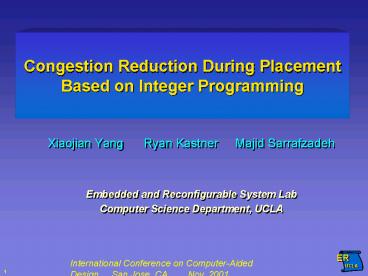Congestion Reduction During Placement Based on Integer Programming - PowerPoint PPT Presentation
1 / 22
Title:
Congestion Reduction During Placement Based on Integer Programming
Description:
ILP based congested spot expansion to alleviate congestion ... Congested Spot. Identify congested spots. Alleviate congestion in the expanded area ... – PowerPoint PPT presentation
Number of Views:28
Avg rating:3.0/5.0
Title: Congestion Reduction During Placement Based on Integer Programming
1
Congestion Reduction During Placement Based on
Integer Programming
- Xiaojian Yang Ryan Kastner Majid
Sarrafzadeh - Embedded and Reconfigurable System Lab
- Computer Science Department, UCLA
2
Outline
- Introduction
- Previous Work on Congestion
- Integer Linear Programming(ILP) Formulation
- Approximation Algorithms
- Congestion Reduction based on ILP solution
- Experimental Results
- Conclusion
3
Introduction
- Main Goals in Placement
- Minimizing Chip Area (old)
- Routability and Timing (modern)
- Objectives/Cost for Routability
- Cut, Wirelength, Congestion
- Why congestion?
- Shorter Bounding Box ? Better Routability
- Congestion models routability better
4
Previous Work on Congestion
- Mayrhofer and Lauther, ICCAD90.
- Partitioning based method
- Cheng, ICCAD94
- RISA model used in Simulated Annealing
- Parakh et. al., DAC98
- Quadratic Placement combined with Area Router
- Wang and Sarrafzadeh, ISPD99, ISPD00
- Post-processing after global placement
- Congestion Estimation
- Yang et.al, Congestion Estimation at early
placement based on Rents Rule - Lou et. al, Congestion Estimation at late
placement stages using probabilistic analysis
5
Our Contribution
- Work Summary
- Post-processing step to reduce congestion
- Routing-estimation for congestion cost
- Reduce congestion in an enlarged area by moving
cells - Our Main Contribution
- Global Picture for Congestion Problem
- ILP based congested spot expansion to alleviate
congestion - Approximation algorithm for ILP
6
Congestion Cost
- Routing Estimation --- Bounding Box Model
k-termimal nets Net weight q(k)
Cheng ICCAD94
7
Congestion Cost
- Routing Estimation --- Bounding Box Model
k-termimal nets Net weight q(k)
Cheng ICCAD94
8
Congestion Cost
- Congestion Cost Function
9
Congested Spot
- Identify congested spots
- Alleviate congestion in the expanded area
10
Congestion Alleviation
- Conflict between expanded areas
- How big the expanded area should be?
11
Problem
- Two expansion areas for each congested spot
- Congestion degree after expanding
- Minimize the maximum congestion degree over the
entire area
12
ILP Based Approach
- For congested spot k
- xk0 small expansion, xk1 large expansion
- For bin (i, j), define incremental degree
bin(i,j)
13
ILP Based Approach
Minimize
Subject to
bin(i,j)
14
Approximation Algorithm
Threshold Rounding
Relaxation
Solve the LP
Rounding
2-approximation algorithm
15
a-Approximation Algorithm
a-approximation algorithm
Proof
a 1.5 at p0.22
16
Congestion Reduction Flow
Wirelength Minimization Placement
17
Experimental Setup
(Dragon)
(Labyrinth)
Wirelength Minimization
Congestion Reduction
Global Routing
Circuits
output1
Dragon produces comparable placement with
commercial tools
18
Experimental Results
Congestion reduction in placement affects routing
result Runtime 11s389s for circuit size 12,000
67,000 (Pentium 733MHz)
19
Bounding Box Wire Length
Wirelength is no longer a good measurement of
routability
20
Routed Wire Length
Congestion models routability better
21
Experimental Results (contd)
Comparison between single expansion and double
expansion
circuit ibm02
22
Summary
- Congestion reduction as a post-processing
- ILP based congestion reduction control
- Approximation algorithms with good bound
- Future Work
- Extend the approach using ILP instead of 0-1 ILP
- Web site http//www.cs.ucla.edu/xjyang/iccad































